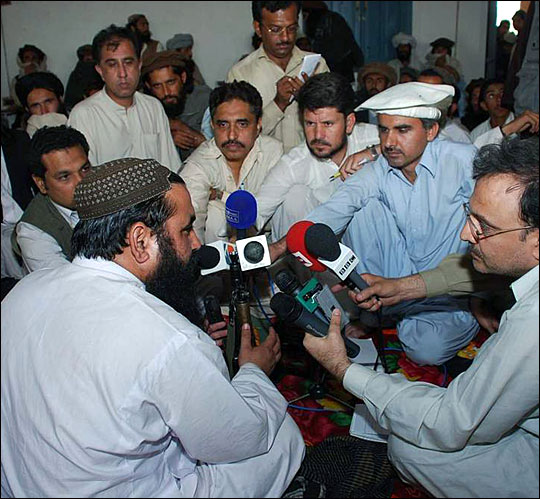Initial Phases of Taliban Operations Complete
BY Herschel Smith
Pakistan’s top Taliban leader, Baitullah Mehsud, left with cap, tells reporters on Saturday he is sending fighters to battle U.S. troops in Afghanistan as he seeks a peace deal with the Pakistani government (NPR).
In featured article Taliban and al Qaeda Strategy in Pakistan and Afghanistan we discussed the dual pronged approach of the Taliban, one aimed directly at Pakistan and led by Baitullah Mehsud, the other aimed at Afghanistan led by Mullah Omar. The Taliban in Afghanistan are more disaggregated than they were even a year or two ago, but there is still at least loosely coupled leadership, even if not immediate communication for fear of cell phone tracking. The Pakistani Taliban are not loosely coupled. They are well led and tightly controlled.
This loosely coupled leadership has charted the exact course that The Captain’s Journal predicted. Not all of the kinetic encounters in Afghanistan have been with Taliban, but the presence of rogue elements other than the Taliban make the security situation even more difficult. As for the Taliban, they have used guerrilla tactics (fire and melt away), suicide bombings, intimidation tactics directed at the population, and standoff weapons such as VBIEDs and roadside bombs.
Baitullah Mehsud has also directed the Taliban campaign inside Pakistan. Baitullah Mehsud has recently reached an agreement with the Pakistani government (the text of which can be found at Pakistan’s Daily Times). It is doubtful that any of the stipulations of the agreement can be verified, since the Pakistani Army will be withdrawing. The Pakistani people and Army are tired of the violence, but Baitullah Mehsud is talking as if a man who has won his sought-after prize.
The leader of the Pakistani Taliban vowed on Saturday to carry on fighting NATO and U.S.-led forces in Afghanistan regardless of negotiations for a peace deal with the government of Pakistan.
Baitullah Mehsud told a group of journalists, invited to his stronghold in the tribal lands of South Waziristan, that he wanted to stop fighting the Pakistan army.
“Fighting between the Taliban and Pakistan is harming Islam and Pakistan. This fighting should come to an end immediately,” Mehsud said.
But he made no commitment about halting attacks in Afghanistan, and said the jihad, or holy war, would carry on.
“Islam does not recognize frontiers and boundaries. Jihad in Afghanistan will continue,” Mehsud said, as guards carrying Kalashnikov assault rifles looked on.
Mark Laity, NATO spokesman in Kabul, said: Such comments come as no surprise to us. Mehsud is a very dangerous man and everybody knows that.”
Just as we discussed in Why is there Jihad?, Mehsud reiterates that they do not recognize boundary lines (or even they thing they represent, nation-states) as legitimate. If the Pakistan Taliban, or Tehrik-i-Taliban, can accomplish their mission by capitulation of Pakistan rather than costly military operations, then they will take advantage of that.
The “agreements” are already having their intended affect.
In Afghanistan, NATO-led troops say recent peace agreements between the Taliban and the government of neighboring Pakistan are already having a negative impact on security on the Afghan side of the border.
NATO officials say over the past three to four weeks, Taliban attacks along Afghanistan’s eastern border have jumped from 60 to 100 incidents a week.
A spokesman for the NATO-led coalition in Kabul says the spike in insurgent attacks is the result of decreased activity by the Pakistani army on the Pakistan side of the border.
Whenever force projection is implemented and the small footprint model for counterinsurgency is rejected, U.S. forces have had success. The Marines have recently had such success in and around Garmser. The initial phases of Taliban operations are complete. Pakistan has succombed to Taliban pressure. Tehrik-i-Taliban will soon be turning their attention more fully to Afghanistan. Will we reciprocate?





On May 26, 2008 at 10:08 pm, trollsmasher said:
I read an article came out in 2007/2006 that predicted that if Pres. Muhsharif would give up the Pakistani army and turn it over to civilian control that the officers that controlled the Taliban would be sent to barracks and the Taliban would fade away. I disagreed with the article then actually wrote a paper on it and see now how naive this gentlemen really was. Now the new leadership in Pakistan wants peace and who can blame them but I do not think they have the stomach to take back a good part of their country from the Talib. Where does that leave Afghanistan and ISAF and US forces SCREWED that is where. Very few times has an insurgency with a nation state safe haven ever been defeated. The only way to win is to seal the border between Afghanistan and Pakistan. Is this doable? we cannot even control our border so I doubt it.